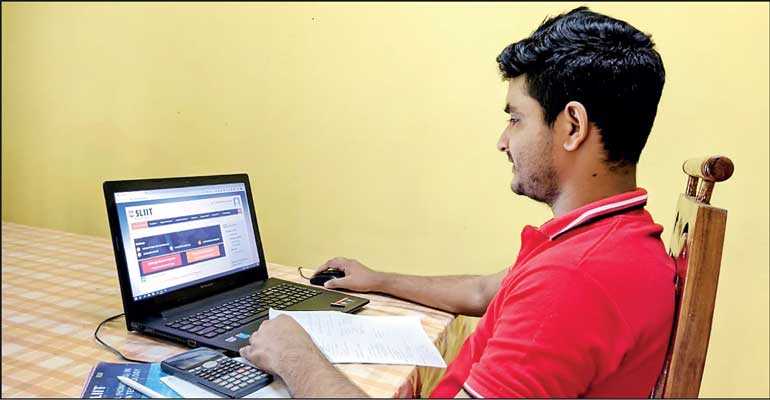Wednesday Feb 18, 2026
Wednesday Feb 18, 2026
Friday, 10 July 2020 00:00 - - {{hitsCtrl.values.hits}}

Marking another first on the road map to perfecting its systems during lockdown, the Sri Lanka Institute of Information Technology (SLIIT) successfully conducted exams for close to 10,000 of its student body. The online examinations were held for students of different faculties such as Computing, Engineering, Business, Humanities and Sciences, Graduate Studies and Research, School of Architecture, School of Law, School of Hospitality and Culinary.
The Deputy Vice-Chancellor of the Institute, Prof. Nimal Rajapakse said that over 95% of students from all their faculties sat for the exams conducted via the internet. “It is unprecedented in Sri Lanka’s higher education system, for such a large number to complete the full stretch of exam papers. The papers were divided into multiple-choice, short answer questions, and the longer three to four-hour papers which had to be answered on paper, then scanned and uploaded to our servers. We had lockdown browsers and other tools and methods to ensure the integrity of examinations. Kudos to our staff for their commitment and completing the semester on time. A technology start-up at SLIIT, Eduscope, led by Dr. Malitha Wijesundera, Dean of the Faculty of Humanities and Sciences, played a major role in our success with online delivery of lectures and exams,” he added.
The exams, which were conducted over a period of three weeks, had each student sitting for 4-6 different subjects. 46,971 students registered for 319 exam papers set by the institute and 44,611 students participated, with just 2,360 non-attendees. The institute had to invest heavily in its IT infrastructure to handle the online delivery of lectures and examinations. “We see the value of this investment and plan to do more to give the best learning experience to our students,” says the Deputy Vice-Chancellor.
“Like any other institution, we had some concerns because it’s the first time something like this was being done on this scale locally. Even international universities with sophisticated online tools had faced challenges, so in that sense, we had some worries – that there could be technological problems, low rates of participation which are issues that cannot be disregarded in a virtual environment. In a physical examination, students would raise a hand to clarify something which was not a possibility with online although we had hotlines managed by staff taking queries on the phone. It was a different environment, but we demonstrated that it is doable. For some courses, there was 100% participation and as far as I know, we haven’t had a single major technical glitch during the 300 plus exams we conducted. We had a few students who had power cuts and other connectivity issues, but we anticipated that and designed the system considering those issues,” Professor Rajapakse says, adding that students who could not sit the exams would have another opportunity to complete them.
“Overall I think it has been an immense success and I believe that our students have understood the benefits and advantages of what we accomplished. Previously, I think they had some concerns – they were thinking ‘what if this goes wrong’ and so on, but now that they have gone through it, they feel it is a good thing,” he said.
Professor Nimal Rajapakse affirms that SLIIT concentrated on creating a level playing field for all students, from the very inception of designing their online exam system, so that their performance during the academic year could be judged fairly. “We used a combination of pass/fail grades and normal letter grades based on the type of exam. For courses with pass/fail grades, students have the choice of writing a regular in-class examination during the next semester to get a normal letter grade.”
“We looked at student concerns and international best practices and designed the system around them, taking care not to create any disadvantages to students. They were sitting for exams from all over the island, so we had to consider that. We created a hotline where a student facing an issue such as a technical glitch, power outage, or any other, could call us and register the problem.”
He adds that neither prepping for online exams nor sitting for them is as easy as it may seem. “Many of the exams had vivas and both academic staff and students had to put in a lot of work to do these online.”
SLIIT Vice-Chancellor Professor Lalith Gamage, says going online wholly was an immense learning curve for both faculty and students, and in doing so, the Institute has gained invaluable knowledge and experience. While they look forward to opening their campus doors to the student body as soon as lockdown conditions ease, the Institute plans to put the experience they gained in online education to good use in the future. Professor Gamage says SLIIT has proved its resilience and will use its knowledge and expertise to enhance the online learning experience and will expand the portfolio of courses to reach a wider section of society.